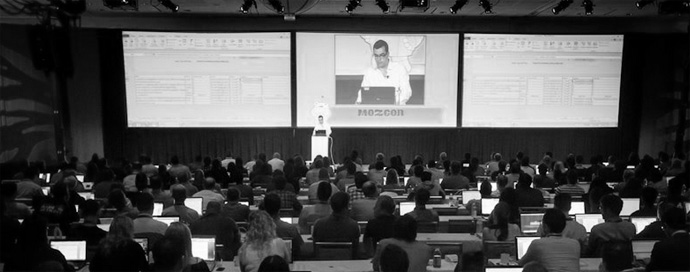Every year for the last 7, we’ve held a customer event in Seattle during the summer (and only been rained on 3, maybe 4 of those years). It started small – I was the only speaker, we had ~100 attendees and the total budget was <$5K. This year, Mozcon had 28 speakers, 800+ in attendance, and a budget of ~$600K+.
The thing is – we usually lose money on the event. That’s why I call it “cheating.”
Mozcon, unlike most of the other industry conferences, doesn’t have to make money. It can’t lose too much (our profit margins are solid, but we need to be putting that revenue to growing the team, our tech infrastructure, acquisitions, etc), but anything close to breakeven is a win. Mozcon’s about delivering an unparalleled experience for speakers and attendees, and if that means spending a small fortune, so be it.
We can pay for speakers’ flights & hotels (which, along with a keynote-style presentation) helps them up their game considerably. We can spoil attendees with free swag, drinks, parties, food, space and power outlets at every seat. We can hire outside A/V companies to make the video, audio and space feel like an Apple launch event. And we can do it without sponsors or booths or anything else that might detract from a purely enjoyable, educational experience.
I’m not writing any of this to help promote the event. It sells out months in advance and ticket prices remain lower than most (we feel an obligation to help keep prices affordable enough that even marketers at small businesses/agencies can attend). I’m writing this because it’s a strategic move that every startup should put in their arsenal.
No matter what industry you’re in or who your customers are, there are opportunities to contribute to your professional ecosystem. With Mozcon, we identified an area of passion and interest – events – and set out to deliver an experience that for-profit providers would be challenged to match. Thus, we removed the primary restriction that makes great events a challenge to deliver – the need for a return on investment. By eliminating that constraint, we can provide a unique, exceptional experience that feels head and shoulders above many others.
My recommendation is to identify these same opportunities in your own field, where competitors or, more likely, those with different business models, pre-existing commitments or restrictions operate. Then find ways that you can deliver something better – content, tools, events, services, advice, community, whatever – by removing that constraint. It need not be financial, either. Sometimes, long-standing partnerships, legal regulation, geographic requirements, need to please multiple audiences or something else may be holding a business back from providing the service/experience that best suits their customers’ desires.
You have but to find that hamstrung set of players and cheat at their game, and the response will likely be extraordinary.
p.s. Of course, it would have gone over a lot better had the wifi held up the first two days, but that will be resolved for next year, along with a new venue. Long story there and I don’t want to give the Westin a harder time than we already have, but last year, we’d agreed to host the event there again on the condition that they make wifi work (and we, perhaps naively, believed their promise to upgrade and support it). Ah well – live and learn.
p.p.s. Reading over this, I also don’t intend to say that Mozcon is vastly superior in every way to every other marketing industry event. In fact, I’m sure it’s not (yet). But it is a good case study to illustrate the “cheating” principle.

